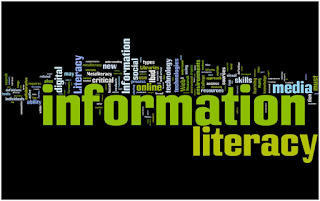Librarians: The Ultimate Search Engine
 |
| Image 1. |
I'm an academic librarian, a highly trained information professional who, among many other things, help people build an active relationship with information and data. What does "active relationship" mean? It means questioning the dominant social, political, and economic assumptions that often shape the creation and dissemination of information, especially in late-capitalist cultures. It translates to comparing the validity of even the most "objective" and "reliable" information against lived experiences. In short, I help patrons recognize the epistemic validity of their own observations and experiences. I show them how their own lived experiences may serve as excellent introductions to scholarly conversations.
 |
| Image 2. |
Even the most sophisticated search algorithms cannot do that...at least not yet. Google and other search engines are superb at finding relevant and not so relevant information. These online tools may even, as Purdy and Walker suggests, even help people make connections among disparate ideas. It may help them become "inventive". But these tools do not seem to engender critical thinking. In the context of this post, "critical thinking" is synonymous with "active relationship".
Does this mean I want to abolish online search engines and return to a totally print-based research model? Of course not. But until scientists invent affective and intellectual computers that can enable affective and intellectual relationships with information, I and other librarians cannot be compared to a search engine--no matter how sophisticated search engine algorithms may appear.
SOURCES
American Library Association. (2014). The ultimate search engine could be you! Accessed 8 September 2014 from http://www.ala.org/educationcareers/careers/paths/childrenyouth
Purdy, J. & Walker J. (2007). Digital breadcrumbs: Case studies of online research. Kairos 11.2, Accessed 8 September 2014 from kairos.technorhetoric.net/11.2/binder.html?topoi/purdy-walker/index.htm
IMAGES
Image 1. The ultimate search engine is @ your library. Accessed 8 September 2014 from http://www.ala.org/advocacy/sites/all/files/content/campaign/print-ready/ultimate-ad.gif
Image 2. Librarians: The ultimate search engine. Accessed 8 September 2014 from http://upstartpromotions.com/images/full/Librarians-The-Ultimate-Search-HSL_i_H11109.jpg


The comparison of a librarian to a search engine is not very useful. A library is an agent in the information profession that utilizes tools. Search engines are tools. To make a logical comparison, one would have to compare comparable things. Now if a librarian isn't an expert on using a search engine, that is a very bad omen for librarianship. The average person is horrible at using search engines. Librarians teach people how to use search engines. If people aren't aware of this, its probably because they are encountering too many librarians who lack information skills.
ReplyDelete